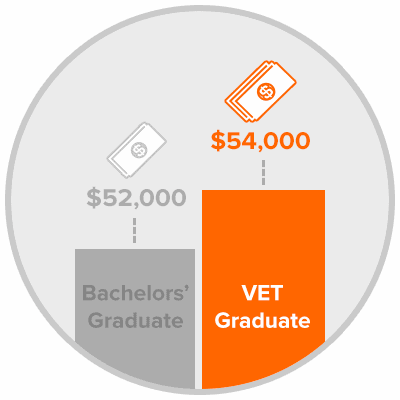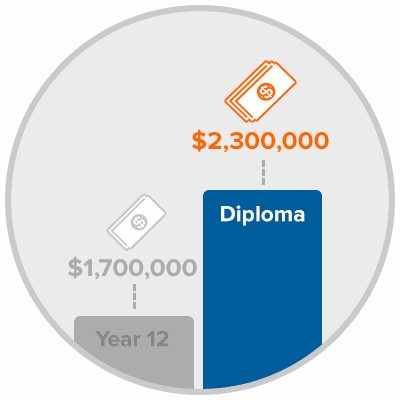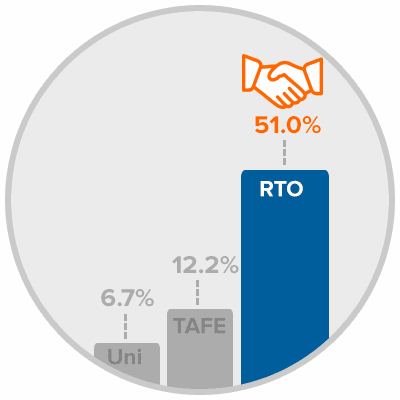
There are many myths about the usefulness of qualifications and the drive to get a ‘piece of paper’, which begs the question – is a diploma worth it? We’ve researched the facts about VET (Vocational Education and Training) qualifications and how much value they have in the modern workplace. The results may surprise you.
What is the value of a diploma?
Courses offered in the VET sector include certificates I to IV, diplomas and advanced diplomas. Qualifications offered in the higher education sector include bachelor degrees, graduation certificates, graduate diplomas, masters degrees and doctoral degrees.
A diploma is a Level 6 qualification under the Australian Qualification Framework. Graduates of a diploma have specialised knowledge for skilled work, can enter the workforce straightaway, and may be eligible to enter into the second year of a relevant bachelor’s degree.
Is a diploma worth the cost?
A diploma offers hands-on skills, along wtih a respected qualification, that is valued by employers. Diplomas are flexible, adaptable, practical and kept up-to-date with strict guidelines. In fact, there are many ways that a diploma comes out on top when compared to university courses.
Diplomas are also a fraction of the cost and provide better value for money. Undergraduate degrees generally cost between $15,000 and $45,000, whereas diplomas often cost less than half or a third of that price.
Is a diploma worth it for you?
Let’s look at eight ways that a VET diploma will give you the best return on investment and whether this makes studying a diploma worth it for you.
- Higher median full-time salary than a bachelor’s degree
- Better long-term opportunities
- Higher lifetime earning potential
- Fast, flexible and future proof
- Value for money
- Better pass rates
- Real-life skills for real workplaces
- Greater and fairer accessibility
 Higher median full-time salary than a bachelor’s degree
Higher median full-time salary than a bachelor’s degree
Many people mistakenly believe that university degrees lead to better starting salaries. In reality, the opposite is true. Research shows that the median full-time income for a VET graduate is $56,000. Meanwhile, the median graduate salary for students completing a bachelor’s degree is actually less at $54,000.
Better long-term opportunities
As the world job market continues to change, it’s wise to think about future career opportunities. The largest key skills of the future are the 4 Cs: Care, Computing, Cognitive ability and Communication. At least 47.4% of all projected employment growth from 2021 to 2026 is estimated to be from a cert I to advanced diploma skill level, meaning that a VET course may give you a huge advantage. Some of the fast-growing jobs of the future that can be achieved with a diploma include:
- Management and organisational analysts – 32.2% more jobs by 2026
- Human resource managers – 16.3% more jobs by 2026
- Occupational and environmental health professionals – 15.9% more jobs by 2026
- Healthcare and social assistance general clerks – 12.9% more jobs by 2026
- Advertising and marketing professionals – 11.4% more jobs by 2026
- Construction managers – 10.2% more jobs by 2026
- Managers – 9.2% more jobs by 2026
Your Career in Leadership and Management
Do you want to learn more about leadership and management skills you need to be a good leader, emerging job roles and salaries, and recent industry insights?
Discover your career in leadership and management.
LEADERSHIP AND MANAGEMENT CAREER PAGE
 Higher lifetime earning potential
Higher lifetime earning potential
The median earnings for those with a diploma or advanced diploma is $12.19 more per hour and $380 more per week than those with just a Year 12 or equivalent level of education. Across the average working life of an Australian, that equates with increased median lifetime earnings of approximately $889,200. That’s an increase of around 40% on what their projected lifetime earnings would otherwise stagnate at.
Fast, flexible and future proof
Skilling Australia Foundation’s 2017 ‘Perceptions Are Not Reality’ report states that today’s school leaver may have up to 17 jobs across five careers in their lifetime. The length of job tenure for working Australians on average is currently around three years. It follows that the bulk of Australia’s workers are upskilling, retraining, career changing or shifting from employment to self-employment and then back again several times throughout their working lives.
Additionally, according to a 2016 survey by Chartered Accountants Australia and New Zealand, two-thirds of early career Australians with less than five years’ experience expect their job will not exist – or will fundamentally change – by 2031. This means most expect they will have to reskill, retrain or face potential unemployment. A VET pathway gives you the ability to build additional skills with a diploma and keep working as you study online. If you’re looking to accelerate your career pathway, this is a fantastic option.
As for fast, you can also complete three or more VET qualifications in the time it takes to complete a typical bachelor’s degree, depending on the course and how you pace your study.
Do you Have What it Takes to Achieve a Diploma?
Assess your ability to take on the challenge of a diploma qualification.
Our unique quiz will calculate if you are in the best position right now to take on a diploma.
GO TO QUIZ
Value for money
Compared with university undergraduate programs, VET usually provides students with a faster pathway to complete a qualification and enter the workforce. Therefore, a diploma can have you in the workforce, earning a better award rate in faster time, for less financial investment than a bachelor’s degree.
Better pass rates
The load pass rate for funded VET courses is 80.4% which is 17.9% higher than university courses.
Real-life skills for real workplaces
VET’s high level of flexibility provides practical programs that teach real-life skills rather than just theory. As a diploma graduate, you can enter the workforce with first-hand experience. Rather than requiring constant retraining once employed, you will have the skills to keep building your career as a valuable team member.
Additionally, the number of employers across Australia using VET as their chosen training platform continues to grow. Employers trust and rely on RTOs (Registered Training Organisations) to provide quality VET qualifications. In 2017, 51% of employers used a private training provider like the College for Adult Learning, compared to 6.7% using university and 12.2% using TAFE.
VET stands out to employers for being:
- Industry led – employers and industry representatives define what outcome is required by training
- National – the system is jointly managed by state, territory and Australian governments
- Client focused – it is flexible, relevant and responsive to client needs
Greater and fairer accessibility
Entry into a diploma generally requires completion of schooling equivalent to Australian Years 10, 11 or 12. Meanwhile, university entry typically has a stricter entry requirement of Year 12 graduated, weighted by the final (ATAR) score. As a result, a diploma provides greater accessibility and opportunity for people looking to advance their career possibilities.
Are you a future diploma graduate?
We hope this post has provided you with high-quality information, facts and statistics that can help you decide whether a diploma is worth it for you.
If you do decide to pursue a diploma, the next step is to choose a respected and well-established RTO who you can trust to deliver your diploma qualification. The College for Adult Learning is proud to be an established RTO providing nationally accredited and endorsed training qualifications. The qualifications we deliver have been developed by industry experts and aligned to the expectations of respected industry associations, including the Australian HR Institute and the Australian Institute of Project Management.
Discover the perfect course for you
Explore the College for Adult Learning's range of courses, across a variety of industries and qualification levels – from certificate IVs to double diplomas, construction management to human resources and leadership.
Discover the course that will help you change careers, upskill, get qualified, promote yourself or find your passion.
EXPLORE COURSES










